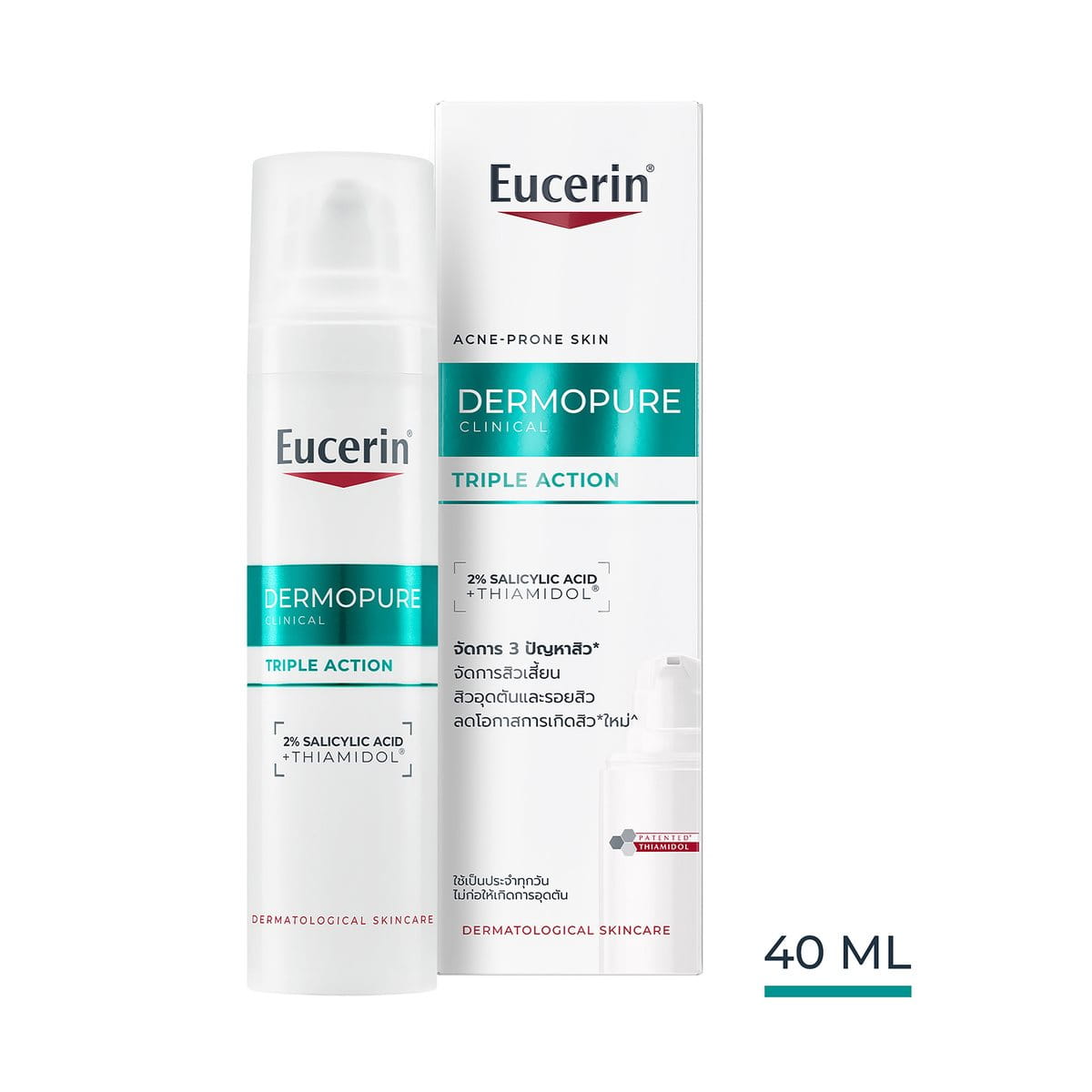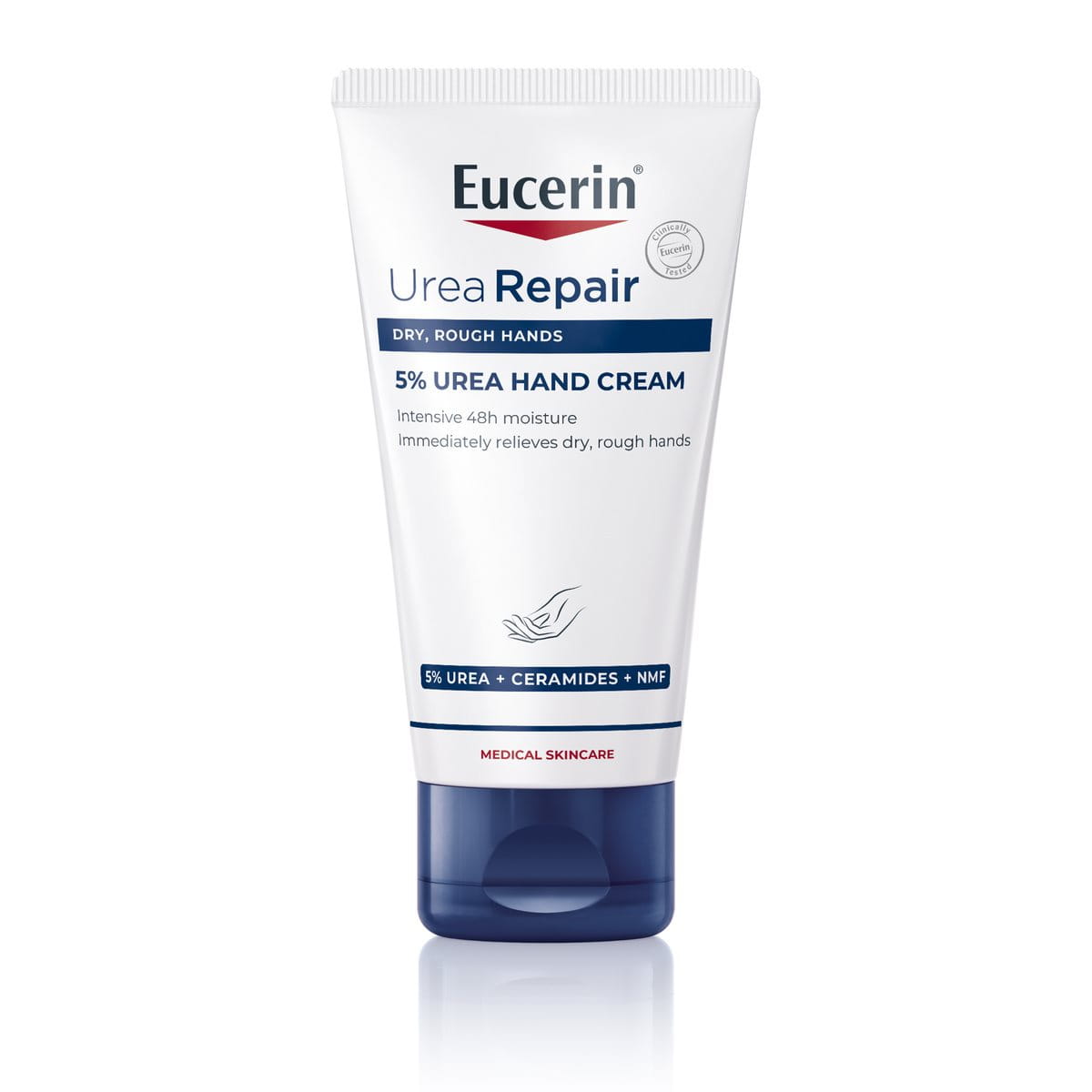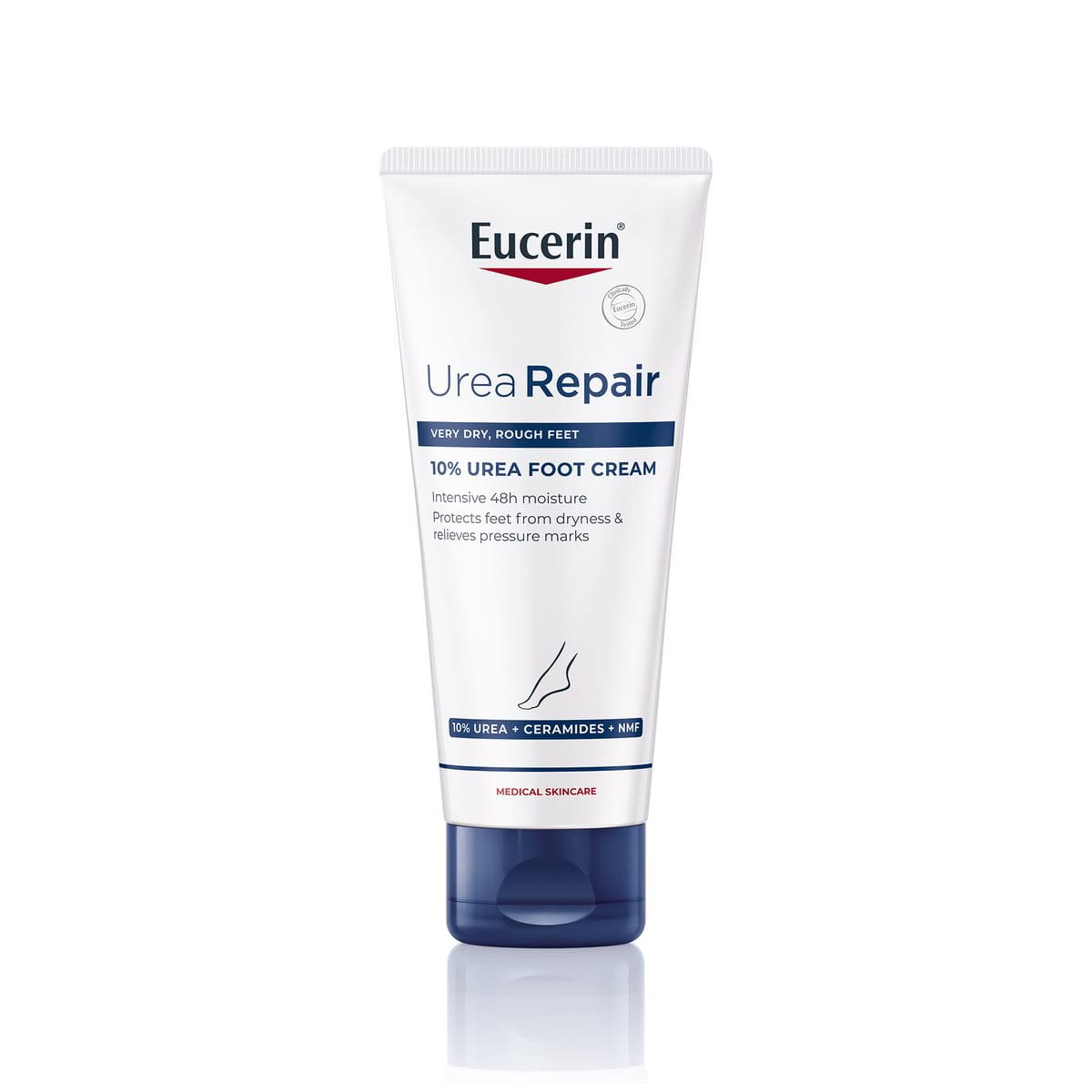Skin is one of our most important organs. It protects us against the environment and gives us our appearance and sense of touch. However, when skin becomes dry, it can feel rough and tight, or even become chapped or itchy, and its ability to function properly is compromised.
Signs and symptoms
Dry facial skin
Dry skin on the face is uncomfortable, and can make a person look older. Dryness usually appears on the cheeks/jowls and around the eyes. Lips often become dry too, especially in winter.
Dry skin on the body
Dry skin on the body can occur anywhere, but is most common on areas of the body such as the hands, feet and shins that are frequently exposed to external factors which can aggravate the condition, e.g. cold weather.
Dryness is a leading cause of skin complaints
A lack of moisture within the skin can present in different ways, ranging from typical roughness, scaling and small cracks to redness, inflammation, constant tightness and itching. However, this will differ depending on the severity and location of dryness.
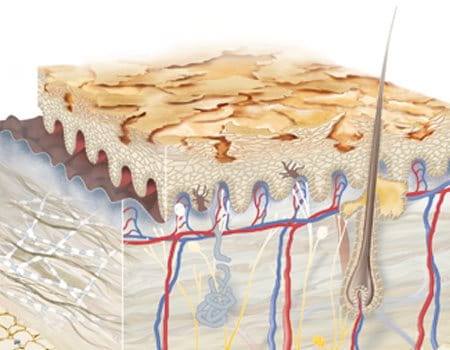
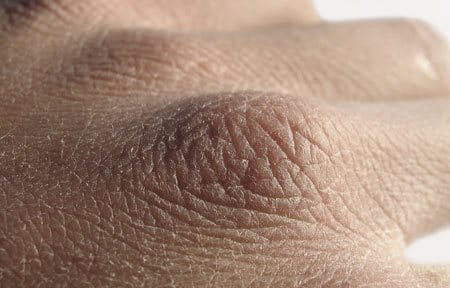
Symptoms of dry skin
Initially, when the skin first begins to lose moisture, it feels:
- Tight
- Rough
Symptoms of very dry skin
If the dryness is not treated, and the skin loses further moisture, it becomes:
- Very tight
- Scaly
- Flaky
- Itchy
Symptoms of rough and cracked skin
Certain areas of the body − particularly hands, feet, elbows and knees − are prone to:
- Extreme tightness
- Extreme roughness
- Skin cracks or fissures
- Intense itching
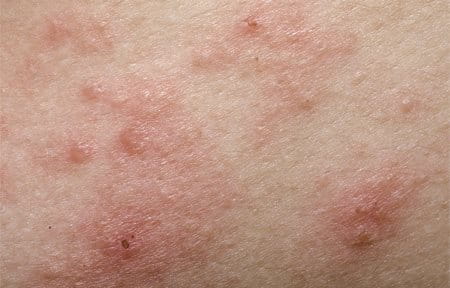
Dry skin can also be related to certain diseases
Xerosis is the medical term for dry skin. It comes from Greek; ‘Xero’, means ‘dry’, and ‘osis’ means ‘disease’.
Keratosis Pilaris (sometimes referred to as ‘chicken skin’) is a common condition linked to dry skin. It is caused when too much keratin builds up in the skin’s hair follicles. Areas of affected skin – most commonly found on the back of the upper arms – are covered with lots of small white or slightly red spots, and skin feels rough and uneven.
Atopic Dermatitis and Psoriasis are also linked to dryness. Both these conditions are genetic and can present other symptoms such as inflammation and intensive itchiness.
Metabolic conditions such as Diabetes and kidney diseases can also affect skin moisture content and may be accompanied by severe skin dryness.
The relation between dry, sensitive and hypersensitive


Dry skin is usually sensitive, and may become irritated when in contact with harsh detergents, soaps or unsuitable cosmetic products. When the skin’s barrier function is disturbed, allergens, irritants, pollutants and microorganism can penetrate the skin more easily.
It is important to avoid skincare products that contain irritating ingredients such as perfumes and colourants. Always check that the product has been dermatologically tested on sensitive skin. Read more about sensitive skin in general or specifically on the face or body.
Hypersensitive skin is a severe form of sensitive skin. It reacts quickly and strongly to triggers that are usually well tolerated by normal skin. These triggers include environmental factors (such as extreme temperature changes and atmospheric pollution), psychological factors (such as stress) and external factors (including spicy food, alcohol, detergents and inappropriate skincare products). Contact results in unpleasant skin sensations such as stinging, itching or burning. To manage hypersensitive skin, sufferers need to minimise exposure to known triggers and follow a special, active skin care routine to increase skin tolerance, reduce irritation and restore skin comfort. Read more about hypersensitive skin in general or hypersensitive facial skin.
Attention
If you need further information to help you identify the cause of your skin complaint, and which treatment route to take, the skin test may be a useful diagnostic tool.
If you are worried or unsure about your symptoms, or they are becoming worse, we recommend you see your doctor or dermatologist for a face-to-face consultation.
Causes and triggers


Environmental
- Harsh weather conditions - hot, cold and dry air.
- Seasonal changes - symptoms of dry skin often worsen during either the winter or summer.
- Ultraviolet (UV) light can increase the rate of skin ageing, and skin becomes more prone to dryness as it ages. Read more about age-induced dryness.
Skin Care
- Frequent washing, or long, hot baths or showers, removes the lipids that make up the skin barrier.
- Inappropriate skin care routine – It is important to follow a routine, and use products, suitable for dry skin. It is especially important not to use alkaline cleansers that strip away natural skin lipids.
Medication
Certain medications and medical treatments (such as radiation therapy, dialysis or chemotherapy) are known to cause dry skin as a side effect.
What causes dry skin?
Dry skin is caused by both exogenous (external) and endogenous (internal) factors.
A person may be affected by more than one of these factors, and the severity of dry skin will increase with the number of compounding causes. Understanding the factors that influence dry skin will help you to prevent and treat the condition.
Normal skin naturally produces hygroscopic (water-binding) substances known as Natural Moisturising Factors (NMF). When skin is deficient in these NMF it loses the capacity to retain moisture.
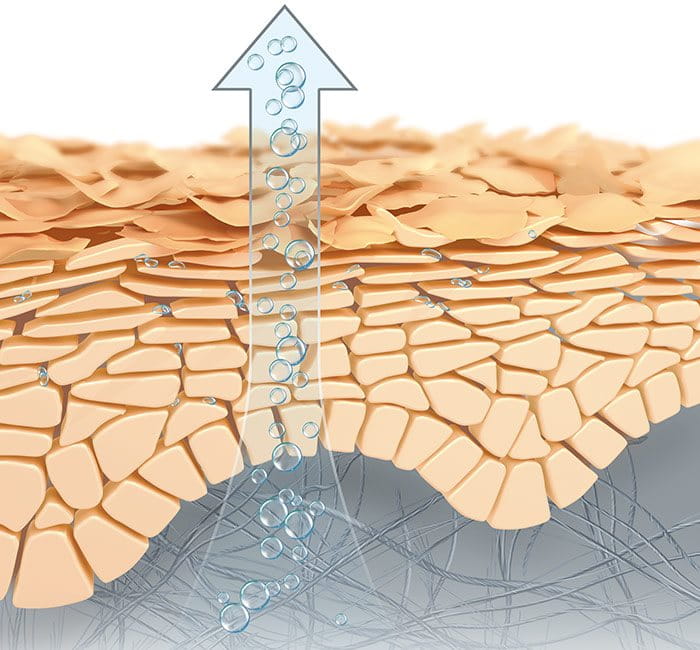
The first step in the moisture loss process is the loss of surface lipids that form a natural barrier on the skin to prevent water evaporation.
Once skin’s lipid barrier is impaired, moisture can be lost more easily. It evaporates out of the skin, leaving it dry. If this condition persists, moisture levels diminish in all the epidermal layers, resulting in very dry skin.
External triggers
External triggers compromise the natural skin barrier, thereby initiating the moisture-loss process.
The main external triggers are:
Attention
Always check with a doctor or pharmacist if you are concerned your medication may contribute to dry skin.
Contributing factors
Factors that can contribute to dry skin
Normal skin is well-moisturised with an intact skin barrier. The main causes of dry skin are discussed above. The following factors also affect the severity of dry skin:


Sun exposure
Excessive sun exposure can also contribute to skin dryness. A sunscreen for dry skin should contain moisturising actives in addition to an appropriate Sun Protection Factor (SPF), thus rehydrating the skin. It is also important that sunscreens (or any other skincare products used on dry skin) do not contain irritating perfumes and colourants as dry skin, especially dry facial skin, is more prone to irritation than normal skin.
Occupational hazards
Certain occupations can also increase the risk of dry skin. Typically these are occupations that require working in hot or cold conditions (farmer/fisherman), frequent use of detergents (doctor/ nurse/ hairdresser), or exposure to chemicals (mechanic/cleaner).

Dehydration
Skin hydration is dependent on the body’s water balance. Dehydration deprives already dry skin of moisture. Elderly people are prone to dehydration as the sensation of thirst diminishes with age. Drinking a minimum of 1.5 liters of fluids daily is essential for maintaining healthy skin.
Smoking
Nicotine and toxins from cigarette smoke may decrease blood flow significantly, resulting in a decreased metabolic rate within the skin. This means the skin dries out more easily and ages prematurely.
Solutions
What solutions are there for dry skin?


Cleansing dry body skin
When cleansing dry or very dry skin, it is vital that the cleanser is effective yet gentle enough not to wash away skin´s own lipids. Ideally, it should also be enriched with NMF, such as Urea, which bind moisture into the skin. Eucerin UreaRepair PLUS 5% Urea Body Wash is a very gentle product with added moisturising factors for dry to very dry body skin that gently cleanses without drying out. It is suitable for those with Diabetes and Psoriasis. The Eucerin UreaRepair PLUS Urea Shower Foam with soothing scent is a gentle and pleasant option for those who want to enjoy a product with a soothing scent suitable for dry skin.
Cleansing dry facial skin
Mild cleansing of the face is particularly important as the use of unsuitable products can increase dryness, which can contribute to the premature development of fine lines and wrinkles. Eucerin DermatoCLEAN Mild Cleansing Milk contains a very effective yet mild cleansing complex that protects the skin from drying out. Eucerin DermatoCLEAN Clarifying Toner gently removes residues, and can be used morning and evening before applying day or night skin care. Read more about an appropriate face care routine.
Moisturising dry skin


Ideally, moisturisers for dry skin should contain actives such as:
- Urea, Lactate and other NMF. These help to bind moisture into the epidermal layers of the skin. Being natural skin compounds, Urea, Lactate and other NMF are non-toxic and non-allergenic, making them well-tolerated, even by people who suffer from extremely dry skin. For optimal care of very dry, rough skin the minimum concentration of Urea should be 5%. Extremely dry, itchy and flaky skin generally requires a higher concentration. The Eucerin UreaRepair ORIGINAL and the Eucerin UreaRepair PLUS ranges consist of lotions, creams and ointments that contain 5% and 10% Urea with products specially formulated for face, hands, feet and body.
- Ceramide which helps to repair the lipid barrier and reduce moisture loss. All Eucerin UreaRepair PLUS products contain Urea, other NMF and Ceramide.
- Gluco Glycerol. This ingredient improves the distribution of water in the deeper epidermal layers of the skin.
Caring for age-induced skin dryness
When skin ages, skin dryness contributes to the premature development of fine lines and wrinkles. Read more about signs, causes and solutions for age-induced dryness. Moisturising becomes even more important to prevent the development of further wrinkles, especially on the face.
Hyaluronic Acid is a molecule that reduces the appearance of dry lines and wrinkles. Hyaluronic Acid is naturally found in the skin, and is an essential component of connective tissue. It has high water binding capacities, improves skin regeneration, and enhances the diffusion of nutrients. The Eucerin Hyaluron-Filler + Urea range, consisting of day, night and eye creme, is uniquely formulated with Urea to bind in moisture and Hyaluronic Acid to reduce the appearance of wrinkles.
Attention
If you are concerned by your symptoms, or unsure of how best to care for your skin, we recommend you see your doctor or dermatologist for a face-to-face consultation.
Avoiding contributing factors
In addition to a good cleansing and moisturising routine, it is important to avoid factors that contribute to dry skin. This will help to reduce the impact of dry skin and the need for treatment:


- Avoid dry air by spending less time outdoors in hot and cold weather, and by using a humidifier indoors when the heating is on.
- Reduce the time spent in hot water by having quick showers instead of long baths.
- Using gloves when washing dishes will help to avoid hot water and strong detergents.
- Wear clothes made of natural materials like cotton and silk that do not irritate the skin. Wool is natural but can irritate, so direct contact should be avoided.
- Try to use a clothes detergent without dyes or perfumes, as these can remain on the clothes after washing and irritate dry skin.
- Use care products without alcohols, perfumes and colourants to avoid irritation.
- Ensure that you drink adequate amounts of fluids.
Internal factors


Genetic influences
Moisture levels in the skin are partly determined by genetics. Some people are genetically predisposed to having dry skin. Skin conditions such as Atopic Dermatitis, Keratosis Pilaris, Psoriasis, Diabetes and Ichthyosis are caused by genetics.
Hormonal influences
Hormonal changes, such as those that occur during pregnancy or menopause, can result in skin becoming dry.
Age
As people get older their skin’s metabolism slows down. Dry skin and ageing are interrelated. Read more about age-induced dryness.
Diet
A lack of nutrients, unsaturated fatty acids and vitamins can contribute to dry skin. Vitamin C and E are also involved in maintaining healthy skin.
Read more about factors that influence skin.
Our brand values

We deliver a holistic dermo-cosmetic approach to protect your skin, keep it healthy and radiant.

For over 100 years, we have dedicated ourselves to researching and innovating in the field of skin science. We believe in creating active ingredients and soothing formulas with high tolerability that work to help you live your life better each day.
